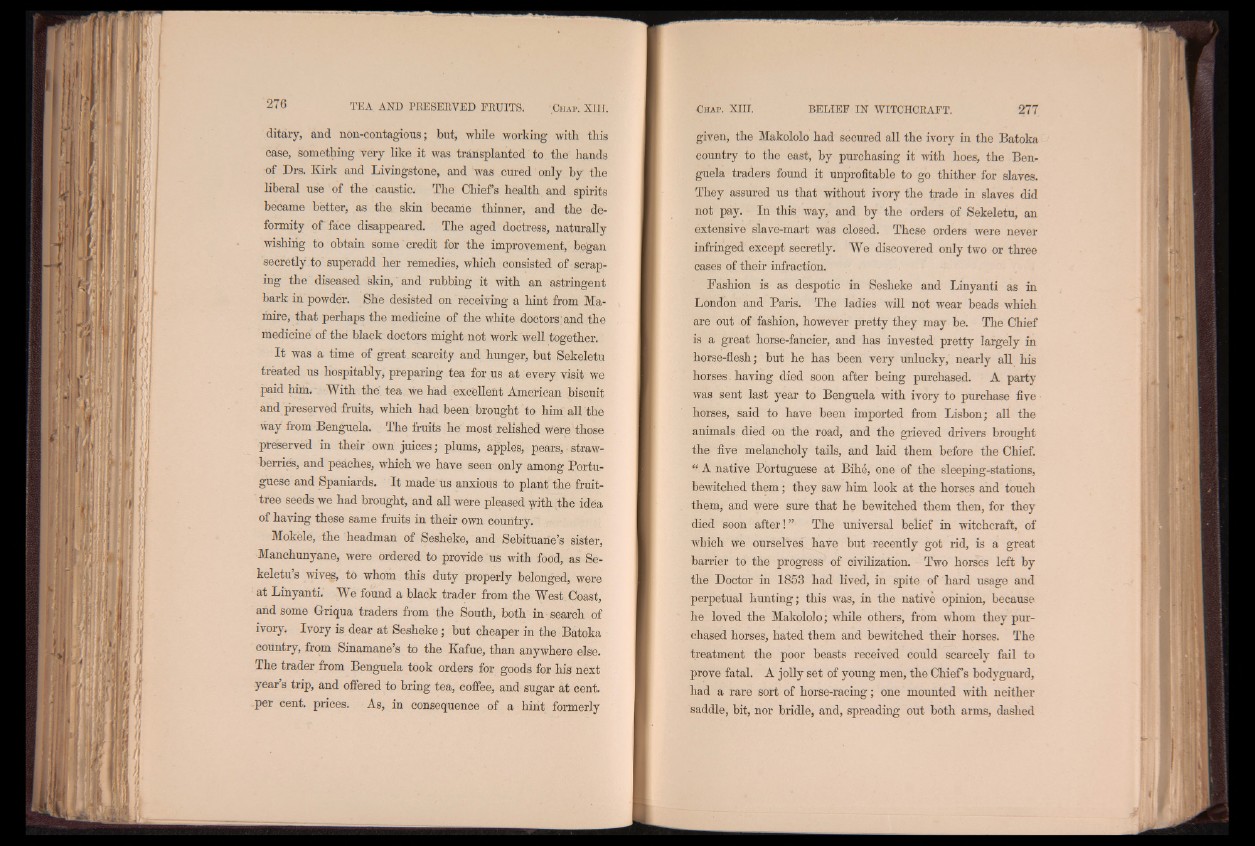
ditary, and non-contagions; but, while working with this
case, something very like it was transplanted to the hands
of Drs. Kirk and Livingstone, and was cured only by the
liberal use of the caustic. The Chiefs health and Spirits
became better, as the skin became thinner, and the deformity
of face disappeared. The aged doctress, naturally
wishing to obtain some credit for the improvement, began
secretly to superadd her remedies, which consisted of scraping
the diseased skin, and rubbing it with an astringent
bark in powdér. She desisted on receiving a hint from Manure,
that perhaps the medicine of the white doctors and the
medicine of the black doctors might not Work well together.
I t was a time of great scarcity and hunger, but Sekeletu
treated us hospitably, preparing tea for us at every visit we
paid him. With the tea We had excellent American biscuit
and preserved fruits, which had been brought to him all the
way from Benguela. The fruits he most relished were those
preserved in their own juices ; plums, apples, pears, strawberries,
and peaches, which we have seen only among Portuguese
and Spaniards. I t made Us anxious to plant the fruit-
tree seeds we had brought, and all were pleased with the idea
of having these same fruits in their own country.
Mokele, the headman of Sesheke, and Sebituane’s sister,
Manchunyane, were ordered to provide us with food, as Se-
keletu’s wives, to whom this duty properly belonged, were
at Linyanti, We found a black trader from the West Coast,
and some Griqua traders from the South, both in search of
ivory. Ivory is dear at Sesheke ; but cheaper in the Batoka
country, from Sinamane’s to the Kafue, than anywhere else.
The trader from Benguela took orders for goods for his next
year s trip, and offered to bring tea, coffee, and sugar at cent,
per cent, prices. As, in consequence of a hint formerly
given, the Makololo had secured all the ivory in the Batoka
country to the east, by purchasing it with hoes, the Benguela
traders found it unprofitable to go thither for slaves.
They assured us that without ivory the trade in slaves did
not pay. In this way, and by the orders of Sekeletu, an
extensive slave-mart was closed. These orders were never
infringed except secretly. We discovered only two or three
cases of their infraction.
Fashion is as despotic in Sesheke and Linyanti as in
London and Paris. The ladies will not wear beads which
are out of fashion, however pretty they may be. The Chief
is a great horse-fancier, and has invested pretty largely in
horse-flesh; but he has been very unlucky, nearly all his
horses having died soon after being purchased. A party
was sent last year to Benguela with ivory to purchase five
horses, said to have been imported from Lisbon; all the
animals died on the road, and the grieved drivers brought
the five melancholy tails, and laid them before the Chief.
“ A native Portuguese at Bihe, one of the sleeping-stations,
bewitched them; they saw him look at the horses and touch
them, and were sure that he bewitched them then, for they
died soon after!” The universal belief in witchcraft, of
which we ourselves have but recently got rid, is a great
barrier to the progress of civilization. Two horses left by
the Doctor in 1853 had lived, in spite of hard usage and
perpetual hunting; this was, in the native opinion, because
he loved the Makololo; while others, from whom they purchased
horses, hated them and bewitched their horses. The
treatment the poor beasts received could scarcely fail to
prove fatal. A jolly set of young men, the Chiefs bodyguard,
had a rare sort of horse-racing; one mounted with neither
saddle, bit, nor bridle, and, spreading out both arms, dashed